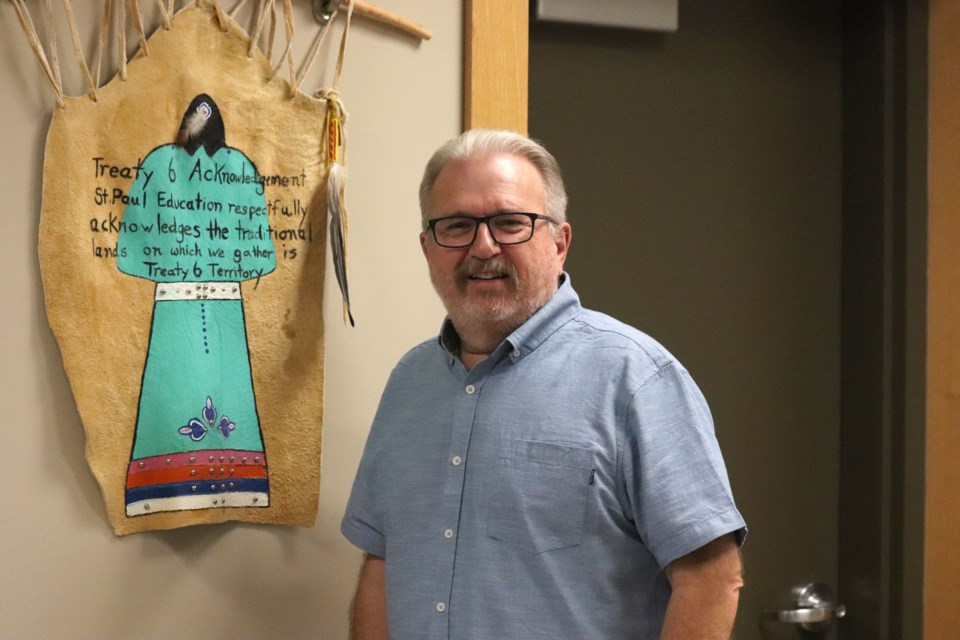ST. PAUL – St. Paul Education’s new superintendent had his first day on the job earlier this month. Peter Barron has 39 years of experience as an educator in Alberta and previously worked as the superintendent for Wetaskiwin Regional Public Schools prior to taking on his new position in St. Paul on Aug. 8.
“We welcome Mr. Barron to the St. Paul Education family and look forward to working with him to continue our pursuit of providing high-quality education for our students,” stated St. Paul School Division Board Chair Heather Starosielski in a news release.
“Mr. Barron was selected from a field of truly outstanding candidates,” she added. “We believe that Peter’s focus on students, his strong work commitment, his ability to work collaboratively, together with his extensive experience in building partnerships will be an excellent fit for building on the current strengths of St. Paul School Division.”
Barron shared a little bit about himself while speaking with Lakeland This Week on Aug. 16. He says he loves to spend time with family, as well as in the company of nature. “So, spending time getting away to a lake or to the mountains and to spend some time with nature... to me, that’s very relaxing and rejuvenating.”
Reading is also a passion for Barron. He particularly enjoys science fiction books. His favourite science fiction book is the Foundation Series by Isaac Asimov. Smiling, he adds, “That’s a trilogy he wrote many, many years ago and Apple TV is actually taking that series and they’ve done a one year version of that.”
For now, Barron has made the move to St. Paul with his dogs, while his wife continues to work for Alberta Education.
St. Paul Education's diversity
Barron shared his excitement about his new role, explaining that St. Paul has a unique school division, filled with diversity and specialized programs. He said, “It’s very attractive to me because of its complexity.”
St. Paul Education serves Kindergarten to Grade 12 students in a variety of schools. There are Catholic students, First Nations students, Mennonite and Hutterite students, and home-schooling learners, among others.
Schools in the St. Paul are a “wonderful” reflection of the diversity in the world, he stated.
“People are not the same and they have needs that are going to be different,” he said. “So, students who have a faith-based education... that’s wonderful. If they choose French immersion... that’s wonderful.”
Challenges
In education - and many other industries in Alberta - staff shortages are among the biggest challenges. Barron said addressing staff shortages are critical, and the school division is paying a close attention to the issue.
“I remember a time when you'd put out an advertisement for a Grade 3 teacher and you'd have 100 applicants... and that's not what's happening now.” Staff shortages also affect many other aspects necessary to schools, beyond classroom teachers - such as bus drivers, educational assistants, administrative assistants, and custodians.
According to Barron, advertisements for positions, particularly for specialized positions, have been put up. Filling specialized positions, like speech-language pathologists (SLPs) and occupational therapists to work with students, have been difficult in many rural school divisions, including St. Paul.
“We can advertise further across Canada for those kinds of roles... job fairs, that type of thing, to try to entice people to come here,” he said.
Alberta also faces a decrease in population in many rural areas as many young people grow up and move to study or work in urban areas. As the number of students attending rural schools decrease over time, funding for those schools also goes down.
“Ensuring that we have programming in all of our schools is essentially an issue of equity, of how can you ensure that a student in a rural high school gets very comparable education to somebody in a larger and more urban area,” said Barron. “Technology is one way to level the playing field because you can bring in all kinds of learning through technology. So, we want to make sure that’s working really well.”
Barron added there are challenges unique to rural areas in the context of education, including transportation costs and professional learning opportunities for teachers.
“What we’ve [rural Alberta] learned is that we need to work together really well,” he said, explaining that St. Paul Education is working in partnership with neighbouring school divisions to share resources and materials. Challenges unique to rural areas also “invite us to be creative in our problem solving,” said Barron.
As the new superintendent, Barron said his approach will be to identify and maintain areas that are working well and improve areas that are not working well by inviting people to share their feedback. Effective problem solving does not mean ignoring issues and challenges but rather requires a positive perspective and an element of curiosity.
Barron is looking forward to the upcoming school year, with staff returning to schools soon and classes officially beginning on Sept. 1. He is also looking forward to getting to know the community.
According to Barron, building connections with the community will be important.



